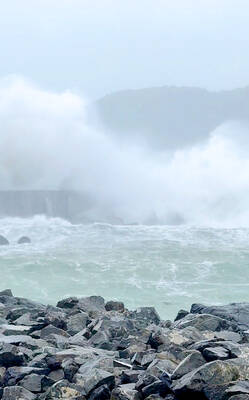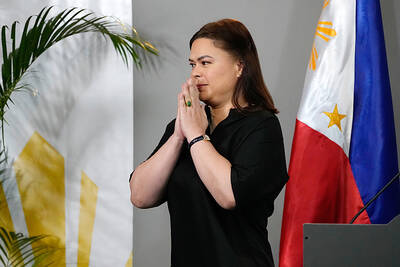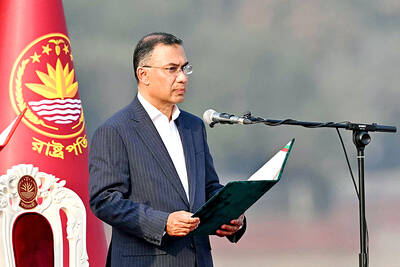The main Kremlin-backed United Russia party was leading in early returns from Chechnya's first parliamentary elections since federal troops reinvaded more than six years ago, a Russian television station said.
The elections were the centerpiece of the Kremlin's strategy to restore stability to the southern region. Few international observers, however, were monitoring Sun-day's elections for the flaws that have marred three previous votes, and a Council of Europe fact-finding mission decried a climate of fear which it said made it hard to hold a genuine democratic ballot.
Analysts say the vote is aimed at cementing the power of Ramzan Kadyrov, 28, the son of the assassinated president, Akhmed Kadyrov.
After casting his vote, Kadyrov told the Interfax news agency that the once-separatist republic was "evolving into a fully fledged member of the Russian Federation."
Election officials said turnout could have been as high as 70 percent, but the pro-independence Kavkaz Center Web site claimed a figure of 5 percent to 7 percent and denounced the elections as "the latest farce."
More than 24,000 police and troops provided tight security during the vote. Chechnya is still beset by violence, with rebel fighters launching regular attacks on government troops and police. Martial law is still in force, and before the election human-rights groups said a free vote would be impossible.
A senior policeman in Grozny said the vote had been decided beforehand and warned it could usher in a period of civil war as Kadyrov moves to assert his complete control over armed groups which support Russian rule.
A broad array of candidates campaigned for 58 seats in the two-chamber parliament, including Mogamed Khambiyev who served as defense minister during brief independence from 1997 to 1999 and who was still fighting alongside separatist militants 18 months ago.
He said: "Today there is madness in Chechnya, but I want to use political means, not arms, to fight it. Our first task is to stop the war here."
United Russia was leading the field, NTV television reported, citing election officials. Turnout exceeded 60 percent, it said.
The United Russia reportedly won 60 percent of the vote on party lists; the affiliation of candidates elected in single-ballot races wasn't immediately clear but most are expected to have links with the United Russia.
Marina Makhchiyeva, a 59-year old retiree selling onions, cigarettes and dried fish near a polling station in the village of Assinovskaya, some 45km west of the capital, Grozny, said two of her sons were killed during the region's second war and her third son died after being beaten by suspected paramilitaries.
"I'm sick of burying my chil-dren," she said. She planned to vote later Sunday, but said "nothing is going to change. This is Chechnya, nothing ever changes."
An estimated 100,000 civilians, soldiers and rebels have died in two wars in Chechnya since federal troops first swept into the region in 1994 to crush its bid for independence.
Russia's forces withdrew after a humiliating defeat in 1996 but stormed back three years later after Chechen rebels raided a neighboring Russian region and a series of deadly apartment-block blasts were also blamed on the separatists.
Moscow hopes that the fourth popular vote since March 2003 will serve as a further catalyst for stability. The Kremlin says the three previous polls -- two presidential, one a referendum -- point to a return to normalcy, along with a recent rock concert, the construction of a new water amusement park, the success of Grozny's professional soccer team and a boxing tournament opened by Mike Tyson in September.
Still, unemployment is endemic and daily violence persists, with rebel fighters staging regular hit-and-run attacks on troops and police and skirmishes between feuding criminal gangs vying for some of Chechnya's substantial oil wealth.

Heavy rain and strong winds yesterday disrupted flights, trains and ferries, forcing the closure of roads across large parts of New Zealand’s North Island, while snapping power links to tens of thousands. Domestic media reported a few flights had resumed operating by afternoon from the airport in Wellington, the capital, although cancelations were still widespread after airport authorities said most morning flights were disrupted. Air New Zealand said it hoped to resume services when conditions ease later yesterday, after it paused operations at Wellington, Napier and Palmerston North airports. Online images showed flooded semi-rural neighborhoods, inundated homes, trees fallen on vehicles and collapsed

‘COST OF DEFECTION’: Duterte’s announcement could be an effort to keep allies in line with the promise of a return to power amid political uncertainty, an analyst said Philippine Vice President Sara Duterte yesterday announced she would run for president of the Southeast Asian nation of 116 million in 2028. Duterte, who is embroiled in a bitter feud with Philippine President Ferdinand Marcos Jr, was impeached last year only to see the country’s Supreme Court throw the case out over procedural issues. Her announcement comes just days before her father, former Philippine president Rodrigo Duterte, begins a pretrial hearing at the International Criminal Court (ICC) in the Netherlands over crimes against humanity allegedly committed as part of a brutal crackdown on drugs. “I offer my life, my strength and my future

NOT YET THERE: While the show was impressive, it failed to demonstrate their ability to move in unstructured environments, such as a factory floor, an expert said Dancing humanoid robots on Monday took center stage during the annual China Media Group’s Spring Festival Gala, China’s most-watched official television broadcast. They lunged and backflipped (landing on their knees), they spun around and jumped. Not one fell over. The display was impressive, but if robots can now dance and perform martial arts, what else can they do? Experts have mixed opinions, with some saying the robots had limitations and that the display should be viewed through a lens of state propaganda. Developed by several Chinese robotics firms, the robots performed a range of intricate stunts, including martial arts, comedy sketches and choreographed

POST-UPRISING: Bangladesh Nationalist Party lawmakers were yesterday expected to formally elect Tarique Rahman as their leader and new head of government Bangladesh’s prime minister-to-be Tarique Rahman and lawmakers were yesterday sworn into parliament, becoming the first elected representatives since a deadly 2024 uprising. Rahman is set to take over from an interim government that has steered the country of 170 million people for 18 months since the autocratic government of Sheikh Hasina was overthrown. The lawmakers, who promised loyalty to Bangladesh, were sworn in by Chief Election Commissioner AMM Nasir Uddin. Bangladesh Nationalist Party (BNP) lawmakers are expected to formally elect Rahman as their leader, with President Mohammed Shahabuddin then to administer the oath of office to the prime minister and his ministers